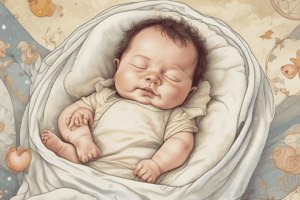Podcast
Questions and Answers
What is the recommended sleep duration for infants aged 0-3 months?
What is the recommended sleep duration for infants aged 0-3 months?
- 10 to 13 hours
- 9 to 11 hours
- 14 to 17 hours (correct)
- 11 to 14 hours
What type of sleep is dreaming associated with?
What type of sleep is dreaming associated with?
- NREM sleep
- REM sleep (correct)
- Light sleep
- Deep sleep
Why is separation recommended for co-sleeping twins?
Why is separation recommended for co-sleeping twins?
- To encourage independent sleeping habits
- To reduce the risk of SIDS
- To reduce the risk of overheating (correct)
- To promote individual sleep schedules
What type of sleep disorders do dyssomnias refer to?
What type of sleep disorders do dyssomnias refer to?
What is catastrophising in the context of sleep difficulties?
What is catastrophising in the context of sleep difficulties?
What is a major issue in LDC regarding sleep?
What is a major issue in LDC regarding sleep?
What is the recommended sleep duration for children aged 5-13 years?
What is the recommended sleep duration for children aged 5-13 years?
What is a risk associated with co-sleeping twins?
What is a risk associated with co-sleeping twins?
What type of sleep problems do dyssomnias not include?
What type of sleep problems do dyssomnias not include?
Who is more likely to experience dyssomnias?
Who is more likely to experience dyssomnias?
Study Notes
Sleep Recommendations
- Infants (0-3 months): 14-17 hours of good quality sleep, including naps, in a 24-hour period
- Infants (4-11 months): 12-16 hours of good quality sleep, including naps, in a 24-hour period
- Toddlers (1-2 years): 11-14 hours of good quality sleep, including naps, with consistent sleep and wake-up times
- Pre-schoolers (3-5 years): 10-13 hours of good quality sleep, which may include a nap, with consistent sleep and wake-up times
- Children (5-13 years): 9-11 hours of good quality sleep with consistent sleep and wake-up time
Types of Sleep
- NREM (Non-Rapid Eye Movement) sleep
- REM (Rapid Eye Movement) sleep, where dreaming occurs
- Importance of quality sleep, not just quantity
Co-Sleeping Risks
- Co-sleeping for twins can lead to overheating and increased risk of SIDS (Sudden Infant Death Syndrome)
- Separation is recommended, such as using a cot on the right
Dysomnias
- Dyssomnias: difficulties with falling asleep or maintaining a satisfactory sleep duration
- More common in children with neurological impairments
- Do not include parasomnias (e.g., sleepwalking, night terrors, bedwetting)
Negative Cognitions
- Negative thoughts (e.g., catastrophising) can maintain sleep difficulties in adults and children
- These thoughts reduce the likelihood of falling asleep
Issues in Low-Income Countries (LDC)
- Importance of medical check-up before addressing sleep problems
- Concerns about screen time and energy drinks affecting children's sleep
Studying That Suits You
Use AI to generate personalized quizzes and flashcards to suit your learning preferences.
Description
Learn about the recommended sleep hours for infants, toddlers, pre-schoolers, and children. Discover how much sleep your little ones need for a healthy development.




